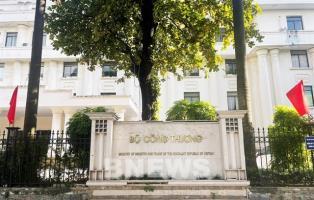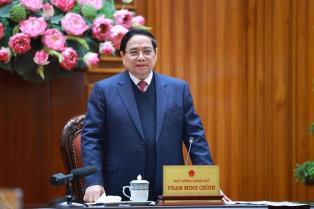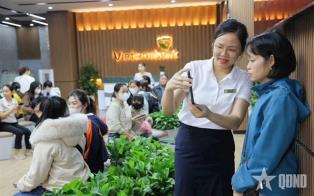In what many are calling a landmark moment for Việt Nam’s development trajectory, the country’s Prime Minister Phạm Minh Chính delivered a compelling vision during a high-level policy dialogue with WEF leadership at the Autumn Economic Forum 2025.

HCM CITY — In what many are calling a landmark moment for Việt Nam’s development trajectory, Prime Minister Phạm Minh Chính delivered a compelling vision on Wednesday during a high-level policy dialogue with WEF leadership at the Autumn Economic Forum 2025.
The forum – the largest of its kind in Việt Nam this year – served as a platform to formalise the country’s commitment to deep structural transformation grounded in digital modernisation and sustainable development.
Việt Nam’s private sector has emerged as the backbone of national growth.
Recent data suggests that the private economy accounts for roughly half of Việt Nam’s GDP, contributes significantly to state revenues, and employs the majority of the workforce.
The PM urged that private enterprises be regarded not only as engines of economic expansion but as core partners in shaping a resilient, innovative, globally competitive economy.
Against a backdrop of global uncertainties – from supply-chain disruption to climate and geopolitical risks – Việt Nam aims to follow dual pathways: accelerating its digital economy while embracing low-carbon growth.
The strategy includes scaling up smart manufacturing, expanding digital infrastructure and services, and promoting clean energy, sustainable logistics, and urban development built around environmental priorities.
Public investment is central: this year the government has committed an unprecedented budget projected at VND 1.1 quadrillion (about US$42 billion) to upgrade transport, energy, digital systems and infrastructure, reflecting determination to boost national connectivity and productivity.
During the dialogue, WEF Managing Director Stephan Mergenthaler responded with robust support.
He praised Việt Nam’s long-term vision, calling the country “on the threshold of a pivotal decade, where innovation and sustainability will define global competitiveness.”
He underscored that Việt Nam – with its youthful population, rapidly evolving tech ecosystem and dynamic economic momentum – is well positioned to lead the shift towards a green, digitally enabled economy in Southeast Asia.
Mergenthaler emphasised the central role of human capital and adaptability in the coming era.
He warned that by 2030, nearly 39 per cent of core workforce skills globally will have changed due to digitalisation and automation – a shift outlined in the WEF’s Future of Jobs framework.
He urged young people and future workers to reframe their mindset: “Working with machines should not be viewed as competition – it is collaboration. Artificial intelligence, automation and smart technologies are tools to amplify human creativity and potential.”
He argued that the future labour market will be built on hybrid human-machine collaboration, where approximately one third of roles involve coordinated human-AI work.
Firms, he said, increasingly demand workers with analytical thinking, adaptability, creativity and cross-disciplinary insight – qualities that remain uniquely human.
Mergenthaler called on Việt Nam’s policymakers, educators and businesses to prioritise lifelong learning, digital literacy, and flexibility to harness the full benefits of technological transformation.
Beyond workforce development, he identified four strategic priorities for Việt Nam’s ambition to leap forward with AI and sustainability: substantial investment in human capacity in both data science and creative problem-solving, improving access for small- and medium-sized enterprises (SMEs) to affordable AI tools, securing digital infrastructure and cyber resilience, and promoting “green intelligence” – the integration of sustainability principles into AI and tech deployment.
He suggested that Việt Nam could emerge as a global frontrunner if it synchronises technological progress with environmental responsibility and social trust.
For HCM City, the host city of the forum, Mergenthaler described it as “a living laboratory” – ideal for trialing smart city governance, digital infrastructure, sustainable urban planning and advanced manufacturing.
He encouraged the city’s leaders to deepen cooperation with WEF’s global network to attract investment, technology and talent, reinforcing its ambition to become a major regional innovation hub.
The PM responded positively to WEF’s backing, expressing gratitude for its coordination and calling for the Autumn Economic Forum to become an annual flagship event — a regular platform to solidify international policy dialogue and business cooperation.
The suggestion was welcomed by WEF and international investors present, who saw in Việt Nam a promising arena for long-term, sustainable growth.
According to PM Chính, as countries and economies worldwide brace for structural changes driven by technology, climate and shifting supply chains, Việt Nam’s dual commitment to digital modernisation and environmental sustainability – backed by strong policy frameworks, investment and international partnerships – may well position it as a rising star in the global economy.
But success will depend on follow-through: timely disbursement of investment, strengthening institutional capacity, upgrading human capital, and ensuring transparent, inclusive implementation.
With voices like Stephan Mergenthaler’s lending credibility and global insight to Việt Nam’s ambitions, the country stands at a crucial inflection point – ready to harness innovation, sustainability and global collaboration to shape its next era of growth. — VNS




